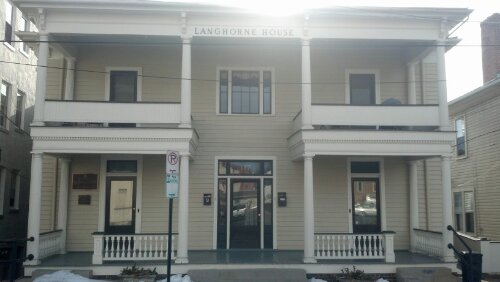https://juicyecumenism.com/2014/02/20/lady-astor-christian-science-hitler-and-danville-virginia/
Lady Astor, Christian Science, Hitler and Danville, Virginia
Did you know that the first woman to serve in Britain’s Parliament was from Virginia? Driving home through Danville, Virginia this week I stopped in the former tobacco hub often recalled as the last capital of the Confederacy. President Jefferson Davis and his cabinet encamped there after escaping Richmond, and in Danville they got word of General Lee’s surrender, which prompted them to scatter farther south. Down the street from the mansion where they met was built a modest house after the war by the parents of Nancy Witcher Langhorne, later known as Lady Astor. Also born there was Nancy’s sister, Irene Langhorne Gibson, whose illustrator husband would model her as the “Gibson Girl,” the celebrated embodiment of classic female beauty starting in the 1890s.
Astor’s father, a Confederate veteran, came from a prominent Virginia family financially sidetracked by the Civil War. Among other jobs while in Danville he was a tobacco auctioneer, reputedly inventing the now traditional auctioneer’s chant. His daughter Nancy was only an infant during their Danville days, but an older daughter was friends with the granddaughter of Jefferson’s Davis’s hosts. The Langhornes left Danville after a few years, and the father eventually became a wealthy railroad industrialist, procuring an antebellum estate outside Charlottesville, Virginia. Astor during World War II loaned it to Britain’s ambassador to the U.S., Lord Halifax, as a weekend retreat from Washington, DC.
The house in Danville later was moved slightly and became apartments in the 1920s. Lady Astor, by then in Parliament, came to visit with her older sister, amid much fanfare, and they identified the room of her birth. Over the last 25 years the “Langhorne House” has been reclaimed and restored as a museum. There are still two rented apartments upstairs to fund the operation. Downstairs the parlor and bedroom of Astor’s birth are restored as they might have appeared in the 1870s.
Unfortunately, the Danville city hall was closed before I could visit its display of a huge portrait that Astor’s husband commissioned of his wife, in the House of Commons, with British statesmen Lloyd George and Arthur Balfour. Intended as a gift for Parliament, the painting was refused, and eventually landed back in Danville, owned by the local newspaper, hosted by the city, and insured by the Langhorne House museum. Astor’s husband was part of the great Astor dynasty of New York. His father had moved to Britain, where his philanthropy elevated him to the House of Lords as a viscount. When the husband inherited his father’s title he was forced to quit the House of Commons, and his wife successfully stood for election and won.
Lady Astor was witty, clever, fashionable, formidable and self-confident. Many witticisms are ascribed to her, but in her supposedly most famous exchange, Winston Churchill bested her. “If I were your wife I would poison your tea,” she ostensibly told him. “If I were your husband, I would drink it,” he reportedly replied.
Lady Astor converted to Christian Science after a spiritual crisis as an adult. She thereafter remained devout to its precepts, based on the teachings of 19th Century mystic Mary Eddy Baker, who claimed that evil and pain, along with all the material world, were essentially illusions for which prayer was the only cure. Christian Science rejects orthodox Christian notions about Christ, portrays God as an impersonal force, and denies that humanity is fallen and needs redemption.
In his 1987 book, Kingdoms in Conflict, Chuck Colson credits Astor’s Christian Science, and its faith in human goodness, for her support of appeasement of Hitler during the 1930s. The Astors’ palatial British home hosted weekend parties of prominent appeasers, including Prime Minister Neville Chamberlain, known as the “Cliveden set.” Charles Lindbergh even visited, as did George Bernard Shaw frequently. There she often also hosted Christian Science lecturers, and she forbade liquor. It’s probably unfair to say Astor was naïve about evil per se. She was always anti-Communist. Likelier she simply imbibed the attitudes of much of the British upper class, which abhorred the horrors of the last world war, believed Germany had been mistreated in the Versailles Treaty, was negative towards France, and hoped negotiations could mollify Hitler, whose malevolent charisma both fascinated and appalled them. She, like much of that class, was also vaguely anti-Semitic although never sympathizing with Hitler’s vast crimes. Certainly she disapproved of Nazi persecution of Christian Scientists in Germany.
Lady Astor deserves credit as Britain’s first female parliamentarian even if she was not correct in understanding the tectonic shifts of history in her time. Her birthplace in Danville is well cared for, and my tour guide was a very dedicated woman whose exertions for historical preservation are extensive and admirable. Astor’s grandson has visited Danville in recent years, impressed by his accomplished and wealthy grandmother’s modest origins.
Danville offers an unusual historical confluence of the Civil War, tobacco, British aristocracy, World War II, and religion’s role in shaping public statecraft.




%5B1%5D.jpg)

No comments:
Post a Comment